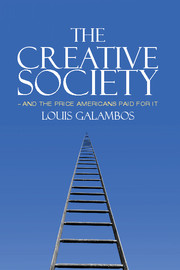Book contents
- Frontmatter
- Contents
- Preface
- 1 1931
- 2 Life, Death, and Learning in the Cities
- 3 Toward a New Economy, 1890 to 1930
- 4 State Crafting – American Style
- 5 Confronting the World
- 6 Winners and Losers, 1890 to 1930
- 7 New Deal Experiments
- 8 Fighting On God’s Side
- 9 The New Aristocracy, 1946 to 1969
- 10 The Suburban Conquest of the 1960s
- 11 Empire in the American Century
- 12 The Tattered Empire of the 1970s
- 13 The Cracked Core
- 14 The American Solution, 1981 to 2001
- 15 Conservatism: Rhetoric and Realities, 1981 to 2001
- 16 The Hegemony Trap
- 17 The American Dream, 1981 to 2001
- 18 The Creative Society in Danger
- Acknowledgments
- Index
- References
18 - The Creative Society in Danger
Published online by Cambridge University Press: 05 June 2012
- Frontmatter
- Contents
- Preface
- 1 1931
- 2 Life, Death, and Learning in the Cities
- 3 Toward a New Economy, 1890 to 1930
- 4 State Crafting – American Style
- 5 Confronting the World
- 6 Winners and Losers, 1890 to 1930
- 7 New Deal Experiments
- 8 Fighting On God’s Side
- 9 The New Aristocracy, 1946 to 1969
- 10 The Suburban Conquest of the 1960s
- 11 Empire in the American Century
- 12 The Tattered Empire of the 1970s
- 13 The Cracked Core
- 14 The American Solution, 1981 to 2001
- 15 Conservatism: Rhetoric and Realities, 1981 to 2001
- 16 The Hegemony Trap
- 17 The American Dream, 1981 to 2001
- 18 The Creative Society in Danger
- Acknowledgments
- Index
- References
Summary
Having worked hard for many years to become a better historian, it's difficult to try to become an adequate journalist. You can't avoid doing that, however, when you start to write about current events. There is no way to stay clear of the heightened emotions, the lack of accurate information, and the flood of media evaluations concerning the nation's policies and leaders. The historian loses the advantage of knowing what the endgame is. The history of the Cold War certainly looked different in 2001 than it did in 1981. But given that all of the major themes of this book have come into play in the last few tumultuous years, we can't avoid this brief venture into the recent past and into the lives of some more American professionals. In an effort to compensate for the loss of perspective, I’ll try to place recent events against the historical template developed in the previous chapters. Maybe that will help.
The W Factor
When George W. Bush took office in 2001, he was riding the wave of a conservative movement that had exercised substantial power in America for almost half a century. You might date the conservative era from 1946, but I believe a more decisive move to the right came with the election of President Eisenhower in 1952. After Ike, the conservative reign was disrupted by the assassination of President Kennedy and the political changes that flowed from that catastrophic event. But the nation soon veered back into conservative territory. Rhetoric aside, the United States has remained basically conservative since that time. Even the 2008 presidential election was not really fought over a liberal-conservative divide. Both of the major candidates worked hard to stay close to the middle of an American political spectrum heavily weighted toward moderation.
- Type
- Chapter
- Information
- The Creative Society – and the Price Americans Paid for It , pp. 290 - 308Publisher: Cambridge University PressPrint publication year: 2011



